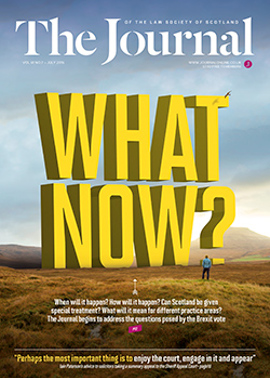Leading by example

A tale from Inverness
When Scottish ministers asked the Keeper of the Registers of Scotland to complete the Land Register by 2024, they also instructed public bodies to lead by example and register all their outstanding land and property onto the Land Register by 2019. Our dedicated public sector engagement team have met with more than 150 public bodies to discuss the voluntary registration process. Currently, Scottish Prisons Service has applications for voluntary registration in for all of its properties, and work is underway to progress titles for the Forestry Commission, several local authorities and NHS boards as well as the Ministry of Defence.
The benefits that private landowners get from a Land Register title, for example making future registrations easier, faster and cheaper, also extend to the public sector, and Sharon Wares, a solicitor with Highland Council, explains why voluntarily registering the Inverness Town House was a positive experience:
“We recently voluntarily registered Highland Council’s historic and very beautiful Town House. I was concerned about the Town House titles being old, with written descriptions, but the application went very smoothly and quickly.
“The Town House is an urban property of historical note, so there was a lot of background architectural history available. In particular, I was able to access information about additional buildings that had been added to the original Town House, which matched the additional land titles from different periods.
“We had an impetus for the voluntary registration, in that it helped us meet the conditions for a Historic Environment Scotland grant for works to the building.
“I think the benefits of moving all of our titles from the Sasine Register to the Land Register would be huge for Highland Council. We don’t currently have all the council’s titles mapped on a GIS system, so having them on the Land Register would help with land management, including land assembly, queries on titles, and protecting land from encroachment. Once the titles are on the Land Register, conveyancing will be faster, easier and more efficient.
“For me, this has been one of the most interesting pieces of work I have ever done, and I’m sure it will make it much easier to deal with the title in the future.
“I think other public sector landowners should definitely consider voluntary registration.”
In this issue
- Environmental law outside the EU
- 2014 revisited: championing Scotland in the EU
- “Justice for sale”
- After the fling
- Traps for the unwary
- Reading for pleasure
- Opinion: Rory Scothorne
- Book reviews
- Profile
- President's column
- Leading by example
- People on the move
- Brexit: a full menu
- Appeal of the new court
- Hostility enacted
- Socially motivated
- Back on the case?
- Send the client in?
- What does Brexit mean for planning and environmental law?
- Immigration meets licensing: not a marriage made in heaven
- Post-Brexit taxation: less of a certainty?
- Scottish Solicitors' Discipline Tribunal
- Community right and commercial sale
- Plane language
- Law reform roundup
- SSDT has a new clerk
- Covered by the terms?
- Ask Ash
- To boldly go...
- Hacking into the law
- Paralegal pointers






